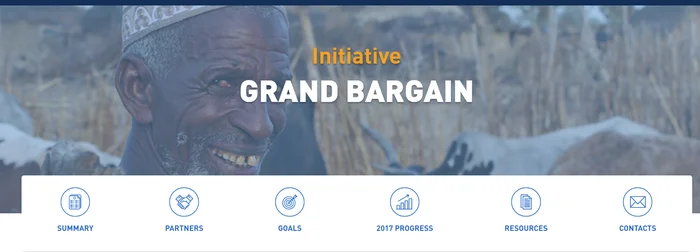The future of humanitarian transparency – assembling the big picture
This guest blog was written by Anna Petruccelli, Senior IATI Specialist at ActionAid UK, and Daniel Stevens, Director, Accountability Operations & Transparency at World Vision International.
Last month we joined representatives from fellow Grand Bargain signatory organisations in The Hague at a workshop on transparency, information-sharing and data. The Centre for Humanitarian Data and Development Initiatives co-hosted the event to review progress and the future direction of the Grand Bargain’s Transparency Workstream.

As part of the Grand Bargain agreement, organisations signed up to publish timely, transparent, harmonised, open and high-quality data on humanitarian funding and activities using the International Aid Transparency Initiative (IATI) as the basis for a common standard. Transparency is sometimes seen as a technical and abstract concept, and publishing data using the IATI Standard is an investment we are often asked to defend in our own organisations. The focus of the event’s workshops on data use was therefore timely, as it helped us reflect on the practical value of transparency.
the power of transparency is that – by building the puzzle – individual actors can make better decisions: co-ordinating better, monitoring changes we want to make, advocating for greater efficiencies
Using a common data standard is like a group of people assembling a jigsaw puzzle. Everyone has to consider how their own pieces fit together (this can take time in itself) then add them to the collective picture. Donors are the corners and edge pieces (sometimes the easiest to do!) but the picture of how aid flows requires all other actors to add their pieces into the middle. While jigsaws are just attractive pictures, the power of transparency is that – by building the puzzle – individual actors can make better decisions: co-ordinating better, monitoring changes we want to make, advocating for greater efficiencies.
Conveying this message is key both to getting senior management buy‐in and within the context of federated and complex organisations. The workshops’ examples presented on how reporting to IATI has contributed to improving systems and reporting processes, and promoted internal data culture shifts, including the encouraging outcomes of the IATI-FTS integration pilot, will provide valuable use cases. It was exciting to see the new prototypes and data visualisation tools which will make IATI data more accessible and digestible. They are a tangible example of the value of reporting more granular humanitarian data to IATI and have the potential to incentivise progress on other Grand Bargain commitments. It was interesting to think about the principles of responsible data and reflect on how we apply them to our current IATI practices.
Finally, it was great to discuss and think about the future as a community, recognising that greater transparency is a means to achieving the collective goals of better decision-making and increased efficiency. In this respect, we look forward to reading upcoming research from Publish What You Fund, which aims to better understand the data needs of national and local respondents.
We all need to work collectively towards a greater ‘standardisation of the standard’.
But there is still some work to do:
- The focus on automation, although a desirable outcome from some points of view (e.g. systems interoperability), might pose the risk of excluding smaller organisations that either don’t have the resources to invest in major ICT projects, or don’t need to. The IATI collective is made up of many actors, of various sizes. If automation will be pursued as an outcome for the workstream, there will need to be appropriate support – both in terms of capacity-building and resources and tools – available to smaller IATI publishers. Otherwise they will be left out to the detriment of the greater goals mentioned above.
- We all need to work collectively towards a greater ‘standardisation of the standard’. The inherent flexibility of IATI lends itself to multiple interpretations of data fields that can in turn lead to a decrease in the usability of the data. IATI publishers need better guidance and tools, and donor requirements need to be harmonised, not diverging from the Standard, to help achieve this objective.
the collective goals can be achieved only by including all voices and providing opportunities for participation and engagement that cater for all actors.
- Although IATI was originally designed to support governments with allocating their resources better, the list of IATI publishers and users has expanded considerably, mirroring the varied composition of both the development and humanitarian sectors. Civil society organisations (CSOs) make up 73% of the total number of IATI publishers but they are often underrepresented within these high‐level forums due to resource constraints. CSOs’ publisher and data-use needs are different from those of governments. For example; CSOs who publish data may be more interested in improving existing publishing tools such as AidStream than in embarking on complex system integration processes. As users, CSOs will be more interested in understanding how data can be used to support decision-making on the ground. Representation of smaller, local and women-led organisations is even lower, but the collective goals can be achieved only by including all voices and providing opportunities for participation and engagement that cater for all actors.
The workshops were a great opportunity to reflect on the progress made so far, and to focus on the future. When thinking about the next steps, building on the learning the event generated will be key to maintaining the momentum and making the community larger and more inclusive. It will also be important to remember that IATI data should reflect internal business processes and enable organisations to tell their own stories, where they are publishing data that truly meets their own needs. This will contribute greatly to publishers seeing how the value of IATI extends beyond mere compliance, and will help add as many pieces as we can to the jigsaw puzzle of humanitarian and development work.